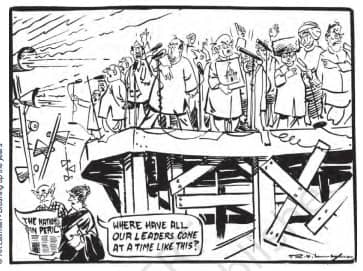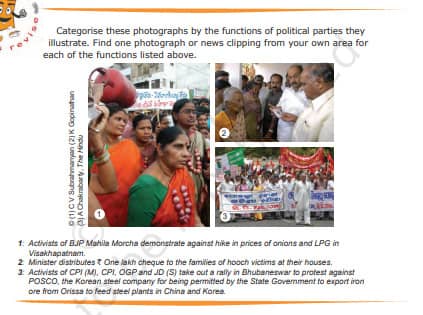Why Do We Need Political Parties? – Concept & Notes PDF
Topic & sub-topics covered: “Why Do We Need Political Parties?” and MCQs Questions: Political Parties (All single detail notes are exam-oriented).
We have discussed in-depth and exam-oriented pointers that can be asked in the board exam of class 10th about “Why Do We Need Political Parties?” from the NCERT Political Science (Civics) notes for class 10th chapter 4 “Political Parties“.
Download the NCERT Political Science (Civics) for Class 10 Chapter 4 Political Parties PDF Notes
Get comprehensive insights into the function of political parties with our Class 10 Political Science (Civics) Chapter 4 Political Parties PDF Notes. This chapter explains the role of political parties in a democracy, political parties structure, and their impact on governance.
The notes cover all important topics like the necessity of political parties, their classification, and the challenges parties face in India. These notes are prepared according to the CBSE syllabus, these notes simplify concepts and provide easy-to-understand notes with the help of different examples to help you prepare for your board/school exams.
Download the PDF now to prepare for your Class 10 Civics exam and enhance your understanding of political parties!
Why Do We Need Political Parties?
1. Political Parties as Key Democratic Institutions:
- Political parties are among the most visible institutions in a democracy.
- For many citizens, democracy is often equated with the existence of political parties.
2. Awareness About Political Parties:
- Even in remote areas, less educated citizens may not know about the Constitution or government structure but are aware of political parties.
- This highlights the pervasiveness and influence of political parties.
3. Criticism of Political Parties:
- Despite their visibility, political parties are not always popular among citizens.
- Many people blame political parties for issues in democracy and political life.
- Political parties are often seen as perpetuating social and political divisions.
4. Necessity of Political Parties:
- The question arises: Do we need political parties?
- A hundred years ago, few countries had political parties; today, almost all democracies have them.
- The omnipresence of political parties suggests their essential role in democratic systems.
5. Understanding Political Parties:
- Before discussing their necessity, it is important to understand what political parties are and what roles they play in governance and society.
Meaning of Political Parties

1. Definition of a Political Party:
- A political party is a group of people that comes together to contest elections and hold power in the government.
- They work on agreed policies and programmes aimed at promoting the collective good.
2. Purpose and Role of Political Parties:
- Political parties reflect fundamental political divisions in society.
- They aim to persuade people that their policies are better than others and seek to implement these policies by winning elections.
3. Partisanship and Partisans:
- Partisanship: The tendency to strongly support a particular party, group, or faction without taking a balanced view.
- Partisan: A person who is strongly committed to a political party or group.
4. Identifying Characteristics of Political Parties:
- A party is identified by:
a. The part of society it represents.
b. The policies it supports.
c. The interests it upholds.
5. Components of a Political Party:
- Leaders: Those who guide the party’s direction and policies.
- Active members: Individuals involved in party activities and decision-making.
- Followers: Supporters who believe in the party’s ideology and vote for it.
6. Political Division and Partisanship:
- Political parties highlight diverse views within society, as opinions on collective good can vary.
- This creates partisanship, which defines their role in promoting specific ideologies.
Functions of Political Parties
1. Key Functions of Political Parties:
- Filling Political Offices: Parties fill political offices and exercise political power.
- Contesting Elections:
a. Elections are primarily fought among candidates put up by political parties. - Candidate Selection:
a. In the USA: Party members and supporters select candidates.
b. In India: Top party leaders choose candidates.
2. Formulating Policies and Programmes:
- Policy Simplification: Parties consolidate a multitude of opinions into a few basic positions.
- Policy Direction: The government formulates policies based on the ruling party’s stance.
3. Law-Making:
- Parties play a crucial role in law-making:
a. While laws are debated and passed in legislatures, members often align with their party’s directions.
4. Government Formation and Administration:
- Parties form and run governments.
- Recruitment and Training: They recruit and train leaders who later become ministers.
- Policy Decisions: Major policy decisions are taken by the political executive from the ruling party.
5. Role of the Opposition:
- Criticism of Government: Opposition parties voice alternative views and criticise the government for its failures.
- Mobilisation: They mobilise public opinion against the government when necessary.
6. Shaping Public Opinion:
- Raising Issues: Parties raise and highlight key societal issues.
- Movements and Pressure Groups: Many pressure groups function as extensions of political parties.
- Opinion Formation: Public opinions often align with the positions taken by parties.
7. Public Access to Government:
- Intermediary Role:
a. Parties act as intermediaries, providing access to government machinery and welfare schemes.
b. Citizens often find it easier to approach party leaders than government officials. - Responsiveness: Parties need to address public needs or risk rejection in the next elections.
8. Terminology:
- Ruling Party: The political party that forms the government.
Necessity of Political Parties

1. Role of Political Parties in Modern Democracies:
- Essential Functions: Political parties are necessary because they perform vital functions such as policy-making, forming governments, and shaping public opinion.
- Imagining a Democracy Without Political Parties:
a. Candidates would be independent, making it difficult to promise or implement major policy changes.
b. Government stability and accountability would remain uncertain.
c. Elected representatives would focus solely on local issues without responsibility for national governance.
2. Example of Non-Party-Based Panchayat Elections:
- Factionalism in Villages: Even in non-party-based panchayat elections, villages split into factions that act like informal political parties.
- Representation Mechanism: These factions function similarly to political parties by grouping candidates into panels.
3. Universality of Political Parties:
- Political parties are present in nearly all countries, irrespective of:
a. Size: Large or small nations.
b. History: Old or new democracies.
c. Development Status: Developed or developing nations.
4. Connection Between Political Parties and Representative Democracy:
- Emergence of Representative Democracy:
a. Political parties emerged as societies grew larger and more complex.
b. They serve as an agency to gather diverse views and present them to the government. Facilitating Governance:
a. Parties bring representatives together to form a responsible government.
b. They provide mechanisms to:
I. Support or restrain the government.
II. Formulate, justify, or oppose policies.
5. Political Parties as a Democratic Necessity:
- Political parties fulfill essential needs of representative governments.
- They are a necessary condition for democracy, ensuring stability, accountability, and policy coherence.
Next & Previous Topics of NCERT/CBSE Political Science (Civics) Class 10 Chapter 4: Political Parties
| Topics No. | Topics Name |
|---|---|
| 1 | Why Do We Need Political Parties? |
| 2 | How Many Parties Should We Have? |
| 3 | Challenges To Political Parties |
| 4 | How Can Parties Be Reformed? |
MCQs on NCERT Civics Class 10 Chapter 4 Tpoic – Why do we need political parties?
Here are top exam oriented mcq’s type questions on “Why do we need political parties?” that you should prepare for your CBSE or state board exams:
Question 1. Which of the following is one of the most visible institutions in a democracy?
A) Judiciary
B) Political Parties
C) Media
D) Civil Services
Answer: B) Political Parties
Question 2. What do political parties symbolize in a democracy?
A) Economic stability
B) Social and political divisions
C) Judicial independence
D) Cultural uniformity
Answer: B) Social and political divisions
Question 3. A political party is defined as a group of people who come together to:
A) Draft laws
B) Contest elections and hold power
C) Conduct judicial reviews
D) Promote regionalism
Answer: B) Contest elections and hold power
Question 4. Which of the following is not a component of a political party?
A) Leaders
B) Active members
C) Military advisors
D) Followers
Answer: C) Military advisors
Question 5. Partisanship refers to:
A) Balanced opinions on political issues
B) Strong commitment to a party or group
C) A neutral stance in political matters
D) Opposition to political ideologies
Answer: B) Strong commitment to a party or group
Question 6. Political parties play a role in contesting elections by:
A) Appointing election officers
B) Selecting candidates
C) Framing the constitution
D) Conducting election campaigns independently
Answer: B) Selecting candidates
Question 7. In a democracy, political parties help in formulating:
A) Regional policies
B) Collective views into basic policy positions
C) Personal opinions on political ideologies
D) Strict one-sided policies
Answer: B) Collective views into basic policy positions
Question 8. Who makes big policy decisions in a democracy?
A) Judiciary
B) Media
C) Political executives from political parties
D) Bureaucrats
Answer: C) Political executives from political parties
Question 9. What role do opposition parties play in a democracy?
A) Support the ruling party
B) Voice different views and criticize the government
C) Avoid participating in elections
D) Support government failures
Answer: B) Voice different views and criticize the government
Question 10. How do political parties provide access to government welfare schemes?
A) Through local leaders
B) By bypassing the government
C) By ignoring citizen demands
D) By acting as intermediaries between citizens and officials
Answer: A) Through local leaders
Question 11. Why are political parties considered necessary for modern democracies?
A) They reduce cultural diversity
B) They simplify the government structure
C) They ensure a stable representative democracy
D) They eliminate electoral competition
Answer: C) They ensure a stable representative democracy
Question 12. What might happen if there were no political parties?
A) Better representation in governance
B) More transparency in elections
C) Independent candidates without unified policies
D) An efficient policy-making process
Answer: C) Independent candidates without unified policies
Question 13. The rise of political parties is linked to:
A) The Industrial Revolution
B) The emergence of representative democracies
C) Economic liberalization
D) Technological advancements
Answer: B) The emergence of representative democracies
Question 14. What is one major function of political parties in large societies?
A) To eliminate dissent
B) To represent diverse views and interests
C) To implement autocratic policies
D) To suppress public opinion
Answer: B) To represent diverse views and interests
Question 15. In a democracy, parties are expected to:
A) Create policies in isolation
B) Mobilize support for the government
C) Justify and oppose policies
D) Overrule democratic processes
Answer: C) Justify and oppose policies
Question 16. Political parties serve as a link between:
A) Citizens and the Constitution
B) Political leaders and judiciary
C) Citizens and government machinery
D) Bureaucracy and businesses
Answer: C) Citizens and government machinery
Question 17. What happens when political parties launch movements?
A) They are dissolved by the government
B) They raise awareness about societal problems
C) They lose public trust
D) They function outside of democracy
Answer: B) They raise awareness about societal problems
Question 18. The ruling party refers to:
A) The party controlling the judiciary
B) The political party that runs the government
C) The opposition party in power
D) Any party with more than 10 seats in parliament
Answer: B) The political party that runs the government

